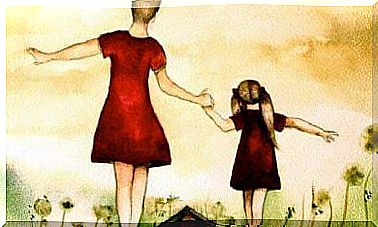Postmodern Loneliness And Myths About Love

Postmodern loneliness is the result of individualism, whose values and ideals have long been at the fore in our world. In this sense, society forces two very contradicting ideas on us: According to the one idea, everyone must go their own way. And according to the other idea, being alone is terrible.
In addition, the postmodern loneliness is exacerbated by the fact that it is becoming more and more common to fear one another. The concept of the good-natured neighbor has almost completely disappeared. In today’s world, the people around us are just strangers. We don’t want to know anything about them because there is something threatening about strangers.
The result is a society in which people are increasingly alone but struggle against loneliness. We have created a world in which we cannot live in a community, but in which we also do not want to be alone. Both loneliness and society are a problem.
Solitude – a concept that became problematic with romance
Until the Romantic era at the end of the 18th century, the subject of loneliness was not of great concern. Until then, loneliness wasn’t something to think about or something to have existential problems with. Individualism also did not play an important role at that time. Basically, people lived in a community. It was common for the whole family to live under one roof. Grandparents, children, grandchildren and close relatives occupied the same room. The neighborly relations were well developed and important for survival. At the same time there were collective rituals in which everyone was involved. Weddings, topping-out ceremonies and church services are only mentioned as examples. There was a clear concept that everyone was part of the community – people knew each other and they lived together, not next to each other.

This changed with romance. The partnership was now the answer to all questions in life. The ideal was that of an isolated, private couple in their own world. Society began to organize around the couple and the small family core. At the same time, loneliness grew in importance and became increasingly undesirable.
Postmodern loneliness
The transition from the extended family and community to a society of couples heralded a new reality that was closely related to the introduction of new technology. This ushered in the era of postmodern loneliness. But now there is a fundamental contradiction: We are connected to the whole world and feel more lonely than ever.

Some people are so lonely that they feel bad if they don’t get likes on their social media posts. In fact, there is so much loneliness that people become dependent on those social networks and the validation they receive here. They are obsessed with receiving and sending messages even when they don’t say anything.
In the context of postmodern loneliness, the couple again gained disproportionate importance. We generally assume that if you didn’t have a partner, you’d be alone, like the world was made up of couples. And a separation puts us in a quagmire of total misery, since the couple is the only recognized source of happiness.
Doubts about the myths of love and loneliness
Perhaps it is time to question the myths of loneliness and love. Postmodern loneliness shows that something is wrong. This culture does not lead to peace, fulfillment or happiness, but rather the opposite. Emotional difficulties and psychological problems are becoming more common.
Let’s start by remembering something most of us already know: we all need love. But romantic love is just one of the many types of love. There is also love within families and between friends, love for ideas and of course for ourselves. If we reduce our sphere of activity to the love of a partner, we become emotionally smaller and more vulnerable.

It is also worth questioning the content of postmodern loneliness. When did we start rejecting loneliness? It is a real state that we cannot escape from. We were born alone and will die alone. Others are always by our side only temporarily, in the form of a loan, to use modern terms. The better we understand ourselves and our loneliness, the better prepared we are to live and die happily.









